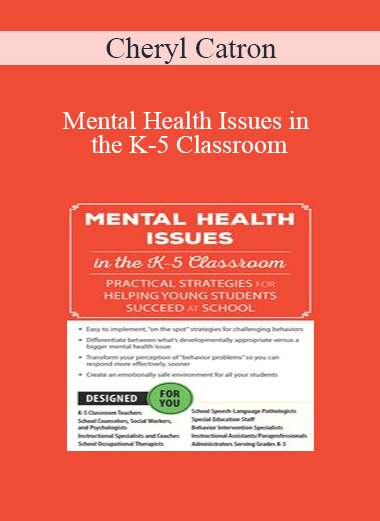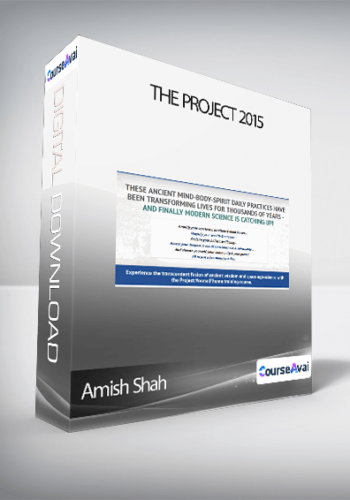Cheryl Catron – Mental Health Issues in the K-5 Classroom: Practical Strategies for Helping Young Students Succeed at School
Original price was: $219.99.$36.90Current price is: $36.90.
[Instant Download] – Immediately deliver the download link after receiving the payment
Description
Unlock your potential with the Unlock your potential with the Cheryl Catron - Mental Health Issues in the K-5 Classroom: Practical Strategies for Helping Young Students Succeed at SchoolCheryl Catron - Mental Health Issues in the K-5 Classroom: Practical Strategies for Helping Young Students Succeed at School course for only course for only Original price was: $219.99.Original price was: $219.99.$$36.9036.90Current price is: $36.90.Current price is: $36.90. at at Giolib.comGiolib.com! Explore our comprehensive library of over 60,000 downloadable digital courses across various ! Explore our comprehensive library of over 60,000 downloadable digital courses across various Medical & HealthMedical & Health. Get expert-led, self-paced learning at up to 80% savings. Elevate your skills today!. Get expert-led, self-paced learning at up to 80% savings. Elevate your skills today!
- Faculty:Faculty:
- Cheryl CatronCheryl Catron
- Duration:Duration:
- 5 Hours5 Hours
- Format:Format:
- Audio and VideoAudio and Video
- Copyright:Copyright:
- Apr 20, 2020Apr 20, 2020
Description
Outline
K-5 Students with Mental Health Issues K-5 Students with Mental Health Issues
- When you know something’s going on, but you don’t know what it isWhen you know something’s going on, but you don’t know what it is
- Characteristics of at-risk studentsCharacteristics of at-risk students
- Why children are not small adultsWhy children are not small adults
- How skill deficits from mental health issues create behavioral difficultiesHow skill deficits from mental health issues create behavioral difficulties
- The difference between “can’t” and “won’t”The difference between “can’t” and “won’t”
- How maladaptive behavior serves as protection for the childHow maladaptive behavior serves as protection for the child
- Common myths and limitations about diagnosesCommon myths and limitations about diagnoses
Oppositional Defiant Disorder (ODD) Oppositional Defiant Disorder (ODD)
- What adults should never say (but usually do)What adults should never say (but usually do)
- How behavior reveals a needHow behavior reveals a need
- Are you (unintentionally) rewarding misbehavior?Are you (unintentionally) rewarding misbehavior?
- Kids who don’t feel badKids who don’t feel bad
- Arguing with a defiant child – who is that about?Arguing with a defiant child – who is that about?
- De-escalation strategies that workDe-escalation strategies that work
Attention Deficit/Hyperactivity Disorder (ADHD) Attention Deficit/Hyperactivity Disorder (ADHD)
- The unique needs of children with ADHDThe unique needs of children with ADHD
- More than a behavior problem: the neurobiology of ADHDMore than a behavior problem: the neurobiology of ADHD
- How to increase confidence and leadership skills in kids with ADHDHow to increase confidence and leadership skills in kids with ADHD
- Decrease disruptions and impulsive behaviorDecrease disruptions and impulsive behavior
- Improve transitions, social skills, and self-regulationImprove transitions, social skills, and self-regulation
- ADHD medications: What do teachers need to know?ADHD medications: What do teachers need to know?
Anxiety Anxiety
- What we know about kids who worry too muchWhat we know about kids who worry too much
- School anxiety – types, characteristicsSchool anxiety – types, characteristics
- What to do about separation anxietyWhat to do about separation anxiety
- The perfectionistic studentThe perfectionistic student
- Drawing out the anxious student in a safe wayDrawing out the anxious student in a safe way
Depression & Mood Dysregulation Depression & Mood Dysregulation
- How depression shows up in young childrenHow depression shows up in young children
- Helping students overcome helplessnessHelping students overcome helplessness
- When is it more than moodiness?When is it more than moodiness?
- Helping depressed kids change their inner self-talkHelping depressed kids change their inner self-talk
Trauma and Other Significant Life Events Trauma and Other Significant Life Events
- What the ACEs study has taught us about traumaWhat the ACEs study has taught us about trauma
- The fight, flight, or freeze response in the classroomThe fight, flight, or freeze response in the classroom
- How to recognize and respond to traumatic stressHow to recognize and respond to traumatic stress
- What if you don’t know the child’s history?What if you don’t know the child’s history?
- Incorporating trauma-informed practices into your dayIncorporating trauma-informed practices into your day
Suicide, Self-Harm, and Bullying Suicide, Self-Harm, and Bullying
- HowHow we talk about suicide is important we talk about suicide is important
- Head banging, hitting, scratching, and other “self-punishment”Head banging, hitting, scratching, and other “self-punishment”
- Helping ostracized children feel connectedHelping ostracized children feel connected
- Why traditional discipline doesn’t work for bulliesWhy traditional discipline doesn’t work for bullies
- Making your classroom an emotionally safe spaceMaking your classroom an emotionally safe space
Other School-Based Considerations Other School-Based Considerations
- Collaborating with student support staff and outside cliniciansCollaborating with student support staff and outside clinicians
- Working with non-cooperative/reluctant parentsWorking with non-cooperative/reluctant parents
- Identifying your own triggers, choosing your battlesIdentifying your own triggers, choosing your battles
- Discipline – IDEA, special education considerationDiscipline – IDEA, special education consideration
- Screen time in the classroom – why reward systems don’t workScreen time in the classroom – why reward systems don’t work
- Limitations of research and potential risksLimitations of research and potential risks
Faculty

Cheryl Catron, M.Ed., LPCC-S, RPT-S Related seminars and products: 4
Cheryl Catron, M.Ed., LPCC-S, RPT-S,Cheryl Catron, M.Ed., LPCC-S, RPT-S, is a long-time educator and mental health clinician who has over 19 years serving students with a wide variety of academic and mental health needs. In her most recent role as a school-based mental health clinician, she provided therapy and support services for K-5 students with differing clinical issues including depression, anxiety, social skills, ADHD, and Oppositional Defiant Disorder. In addition to this, Ms. Catron also served as a consultant for and collaborator with teachers, paraprofessionals, and other school staff members. Drawing on her experience as a teacher, school counselor, and mental health clinician, Ms. Catron provided insightful guidance to develop and implement effective classroom-based strategies that facilitate improved behavioral and academic performance for students with a variety of needs including giftedness, learning disabilities, and emotional and behavioral disturbances. is a long-time educator and mental health clinician who has over 19 years serving students with a wide variety of academic and mental health needs. In her most recent role as a school-based mental health clinician, she provided therapy and support services for K-5 students with differing clinical issues including depression, anxiety, social skills, ADHD, and Oppositional Defiant Disorder. In addition to this, Ms. Catron also served as a consultant for and collaborator with teachers, paraprofessionals, and other school staff members. Drawing on her experience as a teacher, school counselor, and mental health clinician, Ms. Catron provided insightful guidance to develop and implement effective classroom-based strategies that facilitate improved behavioral and academic performance for students with a variety of needs including giftedness, learning disabilities, and emotional and behavioral disturbances.
Cheryl is licensed as both a Professional Clinical Counselor and Supervisor in the state of Ohio and a Registered Play Therapist and Supervisor through The Association for Play Therapy. She earned her Bachelor of Arts degree in English and Secondary Education and her Master of Education degree in School Counseling & Professional Counseling from Ohio University.Cheryl is licensed as both a Professional Clinical Counselor and Supervisor in the state of Ohio and a Registered Play Therapist and Supervisor through The Association for Play Therapy. She earned her Bachelor of Arts degree in English and Secondary Education and her Master of Education degree in School Counseling & Professional Counseling from Ohio University.
She and her husband have recently founded a nonprofit organization, Foothold International, that serves indigenous communities in Kenya, East Africa. Ms. Catron is collaborating with the local government to develop community mental health response systems as well as trauma sensitivity to their outreach programs. She provides mental health training to teachers, health workers, and law enforcement personnel.She and her husband have recently founded a nonprofit organization, Foothold International, that serves indigenous communities in Kenya, East Africa. Ms. Catron is collaborating with the local government to develop community mental health response systems as well as trauma sensitivity to their outreach programs. She provides mental health training to teachers, health workers, and law enforcement personnel.
Speaker Disclosures:Speaker Disclosures:
Financial: Cheryl Catron has an employment relationship with The Counseling Source. She receives a speaking honorarium from PESI, Inc.Financial: Cheryl Catron has an employment relationship with The Counseling Source. She receives a speaking honorarium from PESI, Inc.
Non-financial: Cheryl Catron has a family member who was diagnosed with juvenile bipolar disorder.Non-financial: Cheryl Catron has a family member who was diagnosed with juvenile bipolar disorder.
Future-proof your knowledge with the Future-proof your knowledge with the Cheryl Catron - Mental Health Issues in the K-5 Classroom: Practical Strategies for Helping Young Students Succeed at SchoolCheryl Catron - Mental Health Issues in the K-5 Classroom: Practical Strategies for Helping Young Students Succeed at School course at course at GiOlibGiOlib! Enjoy lifetime access to high-quality digital content, crafted to advance your career and personal development.! Enjoy lifetime access to high-quality digital content, crafted to advance your career and personal development.
- Lifetime Access:Lifetime Access: Permanent access to all purchased courses. Permanent access to all purchased courses.
- Smart Savings:Smart Savings: Benefit from prices up to 80% off original course costs. Benefit from prices up to 80% off original course costs.
- Safe Transactions:Safe Transactions: Process your payments securely. Process your payments securely.
- Practical Insights:Practical Insights: Gain actionable skills relevant to today's demands. Gain actionable skills relevant to today's demands.
- Instant Availability:Instant Availability: Begin your course immediately after payment. Begin your course immediately after payment.
- Flexible Learning:Flexible Learning: Access content effortlessly on any device. Access content effortlessly on any device.
Start expanding your horizons with Start expanding your horizons with GiOlibGiOlib!!





